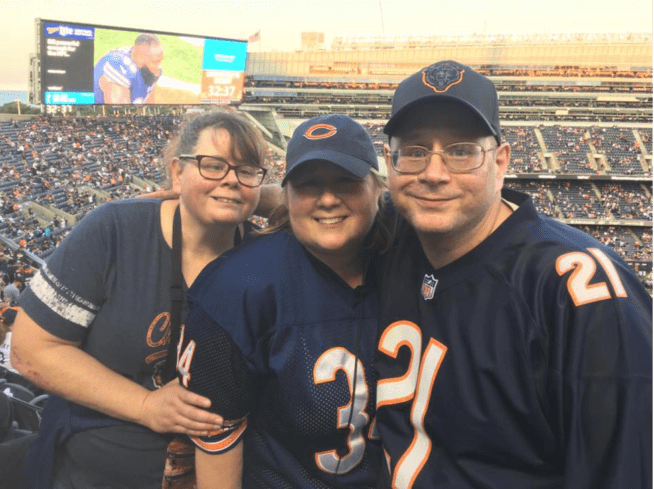My favorite day of the year is the season opener for the Chicago Bears. (That’s American football, if you’re not a sports fan.)
Although I like other sports, like baseball and hockey and running, football is by far my biggest passion.
I get breathless with excitement when we (and when I refer to the Chicago Bears it’s always “we”, as if I am part of the team) play against our arch-rivals, the Green Bay Packers, a storied rivalry that goes all the way back to 1921.
I have a whole drawer full of Bears gear — shirts, jerseys, earrings, hair ties, hats, and socks. I only get to see a couple of games every year since so few Bears games are broadcast here in Portland.
That’s why the highlight of my year is when my brother and I do our annual “Brother/Sister Sports Weekend” which usually involves us seeing a Bears game live, either in Chicago or at one of the away games. Unfortunately, we can’t attend a game this year due to COVID restrictions on sporting events. I know it’s a “first world problem” but it really makes me sad to miss my annual fan pilgrimage.
It made me wonder: what do we all get out of being a sports fan?
If you’re from Chicago, the answer is “mostly heartbreak”, but that’s another post.
Some people aren’t into sports at all. I don’t quite understand those people.
I grew up in Chicago where most everyone follows one or more sport, especially baseball, football, basketball or hockey. But even here on the west coast, most people I know follow some sport avidly.
Why are people all over the world so engrossed in watching sports?
We derive many positive benefits from being a sports fan. Psychologists point out that fans actually get way more from sports than the players.
Players are generally loyal to whatever team they are on, and those allegiances switch if they move to a new team. Fans however stick with one team. True fans stick with their team no matter what — even when they aren’t successful or when the fans move to another team’s territory.
Fans share a collective identity by rooting for their favorite team. When we’re in the bleachers at a baseball game or sitting in a snowstorm watching our football team play, the artificial divides around income, job, cultural identify, and gender often fade away.
We all have one identity: fan.
That’s part of why it’s so hard to have sports closed to spectators this year — we will miss that fan connection. That camaraderie of cheering and heckling players together while drinking a crappy $10 beer and scarfing down a hot dog.
It’s not just the live games. When you see a person on the street wearing a jersey or a hat from your favorite team you immediately recognize a kindred spirit and you feel closer to that stranger on some level. It’s not news that humans tend to organize into clans or groups.
Being a fan gives us that sense that we belong somewhere, that these are “our people”.
Sports fans have a common language and experience and that makes for easy conversation and understanding, creating connection across generations, groups, and backgrounds. It doesn’t matter how different you are — if you like the same sport, you’ll always have something to talk about.
The identification with our team is strong and causes both physiological and psychological changes in fans.
Sports fans feel elated when their team wins, even though they technically did nothing to make that happen — although I like to think it helps my team if I’m yelling in support thousands of miles away.
Fans get upset when a player is injured, as if it’s them on the field cradling a broken bone. People share the misery when their team sucks or suffers a hard loss.
There are changes in our body’s hormones that happen based on sports outcomes, including changes in testosterone and oxytocin (one of the “feel good” hormones).
Sports fans are documented to have higher levels of well-being and happiness and lower levels of depression, social isolation and loneliness.
Sports are about shared emotion. Despite the famous movie expression “there’s no crying in baseball” there actually is crying in sports — and lots of other strong emotions too.
I’ve never seen so many grown men cry as I did when the Bears won the Super Bowl or when I was in Germany one year when their soccer team won the World Cup.
Sports is one of the few places where it’s OK to express extreme emotion — people can be angry, happy, or sad in a safe environment. And our fellow fans are feeling the same.
Being a sports fan also can have a positive impact on your physical health.
Studies have shown that people eat more calories and fat the day after their team loses a big game, and less after a win. Being a fan of a losing team can be hazardous to your waistline.
Incidents of increased blood pressure and even heart attacks have been correlated to the outcome of sporting events — and if you’ve ever sat on the edge of your seat in the last seconds of game watching the play that’ll determine the outcome, you aren’t surprised by this.
Watching a game is high drama and people love that — every game has highs, lows, hopes and anticipation.
Humans have been engrossed in the drama of spectating sports since back in the Roman gladiator days — and likely before that. Sports are fun to watch and can be even more fun when sharing the experience with your fellow fans.
Watching sports creates an escape from daily life. For a few hours you can forget your own troubles and focus exclusively on the movement of a ball, the fairness of the referees, and the successes or failures of your team. It’s cathartic.
Sports also give us a glimpse into what the human body is capable of.
Most people can appreciate displays of extreme athleticism, particularly when watching the best athletes in the sport. When we see a runner fall and get back up, we see a player take a hard hit and keep going, or we see a new record broken, we are in awe of what humans can really do when they’re in peak form and their head is in the game.
So, to sports fans everywhere I say keep on cheering for your team — unless they’re playing against mine. Go Bears!
 Rose Bak is a freelance writer, author and yoga teacher who lives in Portland, Oregon with her family and special needs dogs. As a dedicated multipotentialite, she writes on a variety of topics including self-care, aging, inspiration, business, and pop culture. She is also a published author of romantic fiction. In addition to writing, she teaches accessible yoga and sings. Sadly, she has absolutely no musical talent so she’s forced to mostly sing in the shower. For more of Rose’s work, visit her website at rosebakenterprises.com or follow her on social media @AuthorRoseBak.
Rose Bak is a freelance writer, author and yoga teacher who lives in Portland, Oregon with her family and special needs dogs. As a dedicated multipotentialite, she writes on a variety of topics including self-care, aging, inspiration, business, and pop culture. She is also a published author of romantic fiction. In addition to writing, she teaches accessible yoga and sings. Sadly, she has absolutely no musical talent so she’s forced to mostly sing in the shower. For more of Rose’s work, visit her website at rosebakenterprises.com or follow her on social media @AuthorRoseBak.
Image courtesy of Robert Hernandez Villalta.













